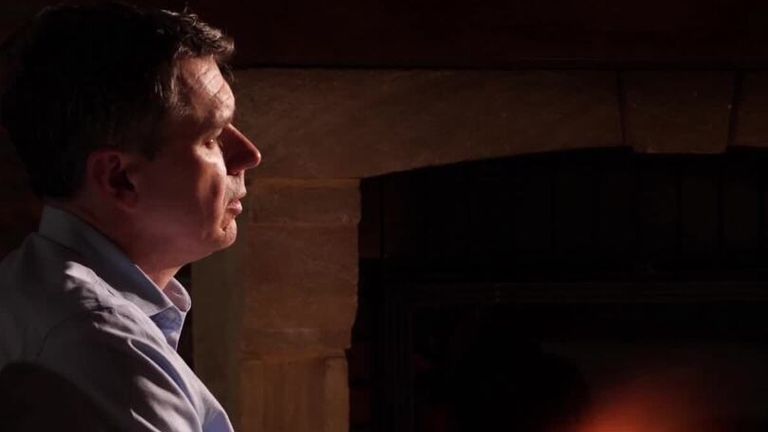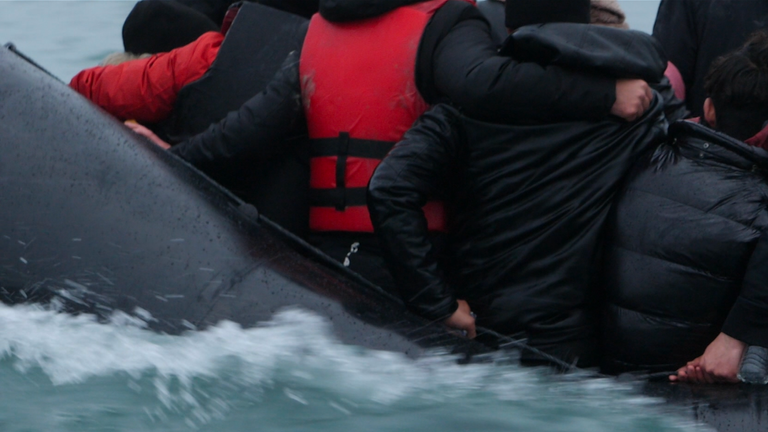An individual at the heart of cross-Channel people smuggling tells Sky News that most smugglers choose to settle in Britain and invest their profits there.
The man, whose identity we won’t reveal, gives details on how the smugglers operate, the rationale behind their criminality, their business model, their relationship with French police and how trafficking could be affected by government plans to send asylum seekers to Rwanda.
In a few days, the government should publish new laws to stop small boats crossing the Channel, with illegal immigration remaining one of Prime Minister Rishi Sunak’s priorities.
Full :
Q&A with a smuggler
This is the first time that a cross-Channel smuggler has accepted a face-to-face television interview. The man, who is Kurdish, spoke to Sky News in great secrecy.
The man, whom we call Garmiyani, said: “Three quarters of the smugglers are in Britain. The money they make here [in northern France], they invest in companies there – in Britain. They live there, life is easier.
“Whatever their nationality, three-quarters of smugglers live in the UK. They are happier there. They rent houses under someone else’s name and drive cars without a licence.
Garmiyani said he was aware of the British government’s drive to break the business model of human trafficking and the proposal to send newcomers to Rwanda, but appeared unfazed.
He said: “I swear that even if they send people to the Amazon, people will come to Britain – it’s their wish to go to Britain.
“It will decrease, but not to the point that refugees won’t come to Britain. People will still try. People will still come.”
Learn more:
How the police exposed the dark world of human trafficking
Six men jailed for human trafficking after joint operation
A record number of Channel crossings in 2022
He said smugglers are playing “hide and seek” with French police as they attempt to launch boats from beaches.
“The police are watching them, and they are also watching the police,” he said. “The smugglers hide and wait for the police to leave, then they do their job [launching the boats]which takes about half an hour.”
He dismissed the claim that French police were too relaxed in their approach, saying “no, that doesn’t happen… they do their job and arrest people.
“It gets harder… In the past it was just [migrants hiding on] trucks. Now the police know where they are sending people from, so they have identified the locations.”
Garmiyani said the smugglers do not see themselves as criminals, but rather as business operators.
He said: “We work and earn money – even helping people. The smugglers don’t see it as smuggling. They see it as another job, like working in a restaurant or a hair salon. Our job is to transfer people to the other side.”
He said migrants arriving at camps near Calais and Dunkirk would be quickly introduced to intermediaries acting on behalf of smugglers, and then choose with whom to leave.
“If there are too many migrants, the prices go up. If the number of people is low, then the prices go down. It goes from €500 to €2,500.”
He also said smugglers would charge different prices depending on the migrant’s nationality: “Albanians pay more, Pakistanis pay more.”
He claimed that some cross-Channel trips are organized by families who team up to buy their own boat and motor, and added that many smugglers waste their profits on “alcohol, drugs and gambling”.
But he insisted he only allowed boats to leave when the winds were light. He was scathing to others, including the people who organized the Channel crossing at the end of 2021 which resulted in the death of 31 migrants.
“Some of the smugglers don’t have a conscience,” he said. “They are mafias, not smugglers, and only do it for the money.
“They know the weather is not good but they are always playing with people’s lives. That night of the incident was one of those nights.
“Those who did – they have no heart.”


